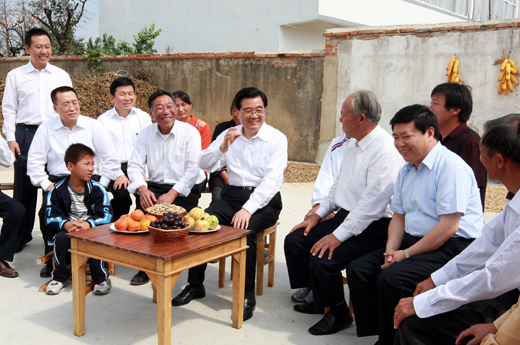Experts proposed radical land reforms to make land management rights transfers freer and liberate rural dwellers from being bound to their lands, ahead of the Communist Party of China's (CPC)'s most important annual meeting.
 |
|
Chinese President Hu Jintao (C) talks with the villagers as he visits the family of Guan Youjiang in Xiaogang village, Fengyang county, Chuzhou of east China's Anhui Pronvince, Sept. 30, 2008. [Xinhua] |
Traditionally, key issues are discussed and personnel is reshuffled at the CPC Central Committee's plenary sessions, the next of which runs from tomorrow until Sunday.
Land reform has zoomed toward the top of this year's agenda, as Party leaders are expected to review an amendment to the land management law, earlier reports said.
From 1978, China adopted collective land ownership for its 750 million rural dwellers, according to which villages or townships assume land ownership. Households manage land, usually on a small scale, for 30-year periods through contractual agreements with village or township communities.
The system had liberated rural households from the highly concentrated feudal land ownership system but today fails to meet residents' income and productivity requirements, the experts said.
Dang Guoying, a professor of rural studies with the Chinese Academy of Social Sciences, said yesterday that the country should promote permanent land contract policies and freer trading of land management rights to ensure a stable land transaction market and liberate farmers bound to their land.
Under the proposed reform, farmers could trade, rent or mortgage their land use rights for profit, which they could then use to fund their relocations to cities, Dang said.
"The move will speed up the country's urbanization by bringing more farmers to the cities with the big farm contractors promoting modern farming in rural areas," www. people.com.cn quoted Dang as saying.
However, many people also fear unregulated land transactions will lead to a concentration of land in the hands of a few, especially during in a time in which the number of landless farmers is growing.
Such concerns could be addressed by beefing up social security to ensure a basic living standard for farmers and by reforming the judicial landscape to ensure fairness in land transactions.
China's rapid industrialization and urbanization has led to severely lopsided development, such as the widening income gap between the urban and rural areas, experts said.
"Reviving the rural economy is the key to China's next stage of development. It is both the new focus and the bottleneck of our country's next round of reforms," Chang Xueze, a professor with the National Development and Reform Commission, told Outlook magazine.
Last month, Hu Jintao, general secretary of the CPC Central Committee, visited Xiaogang village in Fengyang county - the first in China to adopt the household contract responsibility system in 1978. The trip underscored the importance the government has placed on the issue.
Hu said current contractual relations would remain unchanged and stable for a long time to come, and farmers would be allowed to transfer land contract and management rights as they wished.
This week's plenary session, the third since last year's leadership reshuffling, would be particularly important, as it would determine China's future economic direction, Outlook quoted several senior Party academics as saying.
(China Daily October 8, 2008)